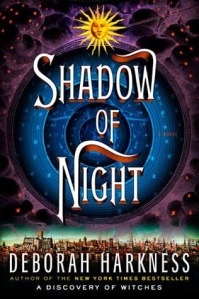Stuck in the middle again
 Dammit. Now I'm caught up on three different trilogies and am facing a wait of at least a year on each.
I guess it's good news that each of the middle installments made me even more eager for the third.
Dammit. Now I'm caught up on three different trilogies and am facing a wait of at least a year on each.
I guess it's good news that each of the middle installments made me even more eager for the third.
The first was Bring Up the Bodies by Hilary Mantel, sequel to her Booker Prize-winning Wolf Hall. And the sequel just made the longlist for this year's Booker; how cool would that be? The second was Shadow of Night by Deborah Harkness, second in her All Souls trilogy about star-crossed witch Diana Bishop and vampire Matthew de Clermont. I liked that one so much I went and re-read the first book, A Discovery of Witches, and liked it way better on a second read. The third middle book was The Twelve, the follow-up to Justin Cronin's bestseller The Passage, a post-apocalyptic vampire epic. (Note to Twilight/All Souls/True Blood fans: These are not sexy kind of vampires.) The Twelve one doesn't publish until October but I got an advanced review copy and devoured it in four days. Three of which I was working for eight of my waking hours.
It's funny but reading, and liking very much, Cronin's work doesn't make me want to go out and get Stephen King's The Stand, the book to which it is frequently compared. I'd be more inclined to check out other dystopias except we've had a lot of that with the recent Key West Literary Seminar and all. If anything the books remind me most of George R.R. Martin's Song of Ice and Fire, just for their masterful plotting and command of huge casts of characters and multiple settings. In Cronin's case that even includes jumping around in time quite a bit and he still pulls it off. At several points in this book he would start with a whole new time, place and group of people and my initial thought would be, come on! I want to know what's going on with Peter and Lish, and how am I supposed to keep all these people, places and times straight? And then found myself getting totally absorbed anyway. Definitely the mark of a good storyteller. Now if only he (and our friend Martin) would write faster.
Why this image for this blog post? Well, there are, appropriately, TWO reasons. Anyone want to take a guess what they are?
